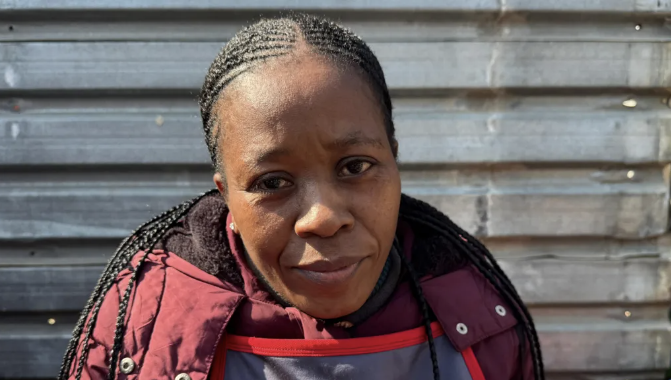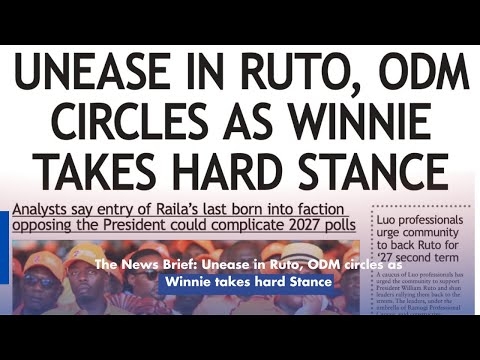

A garment factory in Lesotho, which has produced Trump-branded golf shirts, may have to soon shut down following the massive import taxes, or tariffs, imposed by the US government earlier this year.
The small, southern African kingdom was hit with "reciprocal" tariffs of 50% - a higher rate than any other country - when they were announced by US President Donald Trump in April.
Although they have since been put on hold, Trump says they will be reimposed this Friday, 1 August, along with other countries around the world, unless a separate deal is reached.
"We don't know how we survive this one. We are going to die," Aletta Seleso tells the BBC in a bleak voice standing outside Precious Garments, where the Trump golf shirts have been made.
The mother of one young child has worked there for almost a decade, also supporting her extended family on her monthly salary of $160 (£120).
Lesotho has become known as the "denim capital of Africa". The country's garment factories also produce jeans for iconic American brands such as Levi's and Wrangler.
But the uncertainty over the future of the country's clothes industry is one reason why Lesotho declared a national "state of disaster" earlier this month in order to speed up job-creation.
The BBC meets Ms Seleso during her lunch break just outside Precious Garments.
She joins hundreds of workers streaming out of the factory with their lunch boxes in one hand and water bottles in the other as they try to find a spot in the weak sun of the southern hemisphere winter to enjoy their home-cooked meals.
Most workers, with blankets wrapped around their bodies, huddle in groups with their backs to the sun as they try to soak up a bit of warmth.
She has been working at the factory as an embroiderer for the past eight years and had little reason to worry about her job - until the US tariffs announcement in April.
She says workers have been told that the firm "can close any time from now".
"They say it's about a tariff," she says.
In the meantime, Ms Seleso and her colleagues have been told to work for two weeks a month, meaning they get just half the pay.
She says it is now "so hard" for her to support her child, mother and her late younger sister's two children, who are all under her care.
The BBC has approached Precious Garments for comment.
But Sam Mokhele, the secretary general of one the unions representing 150 workers at the firm, says the company had not "indicated any sign of shutting down" at the moment.
"But what they said was [they may have to] shut down if things do not change," he says.
Ms Seleso is appealing to the government to engage with the US and try to find a viable solution to the tariff question.
Despite her desperate situation, she at least still has an income – but others are not so fortunate.
On the other side of town, in Maseru's Thetsane industrial site, dozens of desperate job seekers gather outside another garment factory, CGM.
The factory, one half of the CGM Presitex Jeans Manufacturer, has closed but there have been rumours it may soon reopen.
The would-be workers stand in small groups, clutching water bottles, their only source of sustenance for the day, as they listen and hope they will be among the lucky few.
Among this group, mostly women, is Puleng Selane, who has been job-hunting since March.
Since 2018, the mother of three has worked as a security guard, along with a variety of other jobs.
The young woman now relies on the sale of medical face masks to support her family - which even on a good day only brings in enough money to buy maize meal and paraffin.
"Now life is so hard... we often eat once a day but sometimes go to bed without any food," she says.
Although the 50% tariff has been paused, Lesotho's exports to the US are still subject to a 10% tax, like the rest of the world.
Until this year, its exports had not been subject to any US tariffs under the African Growth and Opportunity Act (Agoa) - a law passed in Washington in 2000 to allow duty-free access to the US for goods from some countries in order to alleviate poverty and create jobs. This was part of the "trade not aid" philosophy.
The textile and garment industry is Lesotho's largest private sector employer providing, at its peak, around 50,000 jobs, out of a population of just over two million.
The figure now hovers around 36,000 according to the government, with 12,000 jobs directly affected by the US tariffs.
Precious Garments at one point hired 4,000 workers.
But the Lesotho textiles boom boosted by Agoa meant that it had a trade surplus with the US - exporting more than it imports from the country.
And that was why Trump imposed such high tariffs on the country, which appear to have put an end to Agoa, threatening the future of the one bright spot in the country's economy.
Despite the relative success of the clothes factories - until now - the country as a whole is still struggling to create enough jobs for its young population.
Unemployment stands at 30% but for young people the rate is almost 50%, according to official figures.
Youth activist Tšolo Thakeli tells the BBC that even without the latest threat to the textile sector, the situation is "tragic" as there are "literally no jobs in the country, especially for the youth".
"We have graduates from every level... not having jobs. There's a serious state of hopelessness amongst the youth," he says.
And while there are myriad reasons, Mr Thakeli blames the "nepotism [and] corruption" that many allege runs rampant in the country.
The 31-year-old entrepreneur and qualified lawyer is a vocal critic of Lesotho's government and was arrested after he posted a video on social media questioning whether Prime Minister Sam Matekane's promise to create 70,000 jobs in two weeks was realistic.
He tells the BBC the prime minister lacks a proper plan to tackle the crisis.
"There's nothing tangible that the government has done or set to address the problem. [It's just] empty promises," he says.
This is denied by Trade Minister Mokhethi Shelile, who insists that the government is working to try and resolve the issue.
"We already had some solutions, even before the tariff was announced, because the US market was already beginning to be a difficult market for us," he tells the BBC.
He says the country is "already shifting to production for South Africa" and that as things stand, only "20% of the garment industry supplies the US market".
Mr Shelile is speaking to the BBC outside another factory hit hard by the uncertainty caused by the tariffs.
TZICC, owned by a Taiwanese national, has been operational in Lesotho since 1999, producing sportswear for the likes of JC Penney, Walmart and Costco.
At the height of operations, the firm produced 400,000 garments a month but when the BBC visits, hundreds of sewing machines lie gathering dust in one of the warehouses.
A manager at the firm, Rahila Omar, says the company's 1,000 employees, mostly women, have been laid off for the next four months due to a halt in orders.
"Because of the... pressure of the tariffs, our buyers wanted us to finish the order or the quantity as soon as we can. We were given a deadline of 30 June, but we finished before 30 June, and that's why we have a layoff," she says.
Ms Omar says TZICC is waiting for an update on Agoa and whether the current tariff structure would be reviewed before deciding on the next step. Even if the current 10% tax remained, without Agoa, it would not be enough for the firm to reopen as there would be "some additional charges" to consider, she explains.
And while the factory also supplies clothing to South African retailers, Ms Omar says the income generated from these pales in comparison to what the firm earns from the US market.
Despite the government's assurance that it is working to resolve the issue - with the minister even promising a desperate passer-by who spotted him during our interview that "it's going to work [out] at the end of the day" - for Ms Seleso and Mr Thakeli, these are hollow words for the country's despondent and hopeless workforce.
















